BEIRUT: Lebanon’s parliament sat Tuesday in a conference hall to allow for social distancing between lawmakers amid the coronavirus pandemic, while outside anti-government protesters demonstrated in a car convoy.
As the country struggles with a battered economy, MPs approved the re-allocation of $40 million from the World Bank to help fight COVID-19, which has officially infected 677 people and killed 21 nationwide.
It also passed a law to fight corruption in the public sector and set up a national body in charge of stamping out graft.
On the agenda of the three-day session were proposals for a divisive general amnesty, to legalize cannabis for medical use, and to lift immunity for ministers and lawmakers to allow prosecutions for corruption.
Outside the venue, dozens of protesters drove a noisy convoy of cars covered in slogans, drivers honking their horns and passengers brandishing the national flag and leaning out of the windows in face masks.
They took to the streets on wheels to protest deteriorating living conditions while maintaining social distancing, as they kept up the pressure on a political elite under fire since mass protests erupted last October.
“Today, instead of passing a general amnesty law... they could pass a law on the independence of the judiciary,” Jad Assaileh, a young demonstrator said.
“We want to recover the stolen money,” he said, referring to allegations that Lebanon’s ruling elite transferred billions out of the country while regular citizens were prevented from withdrawing their savings by the banks.
Similar protests took place in the cities of Saida and Tripoli.
Lebanon’s worst economic crisis since the 1975-1990 civil war is now compounded by the lockdown. Poverty has risen to 45 percent of the population, according to official estimates.
Protests had petered out after a new government took office in January, and demonstrators have largely remained at home since the coronavirus lockdown started mid-March.
But on Friday, hundreds again protested in Tripoli to mark six months since the street movement started to demand an overhaul of a ruling class widely deemed inept and corrupt.
The lawmakers met in a 1,000 seat conference hall at the UNESCO Palace in Beirut, as part of measures to halt the spread of the novel coronavirus.
Among their 66 items to discuss, legalizing growing marijuana for medical purposes was expected to be approved by a majority as it could generate revenue for the indebted state.
Lebanon bans growing, selling and consuming cannabis, but illicit production in the country’s east has developed over decades into a multi-million-dollar industry.
No consensus was in sight, however, for a general amnesty to free thousands of detainees and to suspend arrest warrants for thousands more.
Supporters — which include Shiite movements Hezbollah and Amal as well as the Sunni Future Movement — say an amnesty could lessen overcrowding in jails housing 9,000 prisoners.
But its detractors, including the president’s Christian parliamentary bloc, say the bill is merely an attempt to boost popular support.
The amnesty has long been a demand of the families of some 1,200 so-called “Islamist detainees,” most of whom hail from the Sunni-majority city of Tripoli, where the former premier’s Future Movement is dominant.
They are accused of carrying out crimes including fighting and assaulting the army, taking part in clashes in the city, and planning explosives attacks.
Families have also clamoured for the release of thousands more detainees from the eastern regions of Baalbek and Hermel, where Hezbollah and the parliament speaker’s Amal Movement are powerful.
Most of these are accused of drug-linked crimes including growing hashish illegally, or other offenses such as stealing cars.
Lebanon, one of the most indebted countries in the world with a debt equivalent to 170 percent of its GDP, defaulted on payments for the first time last month.
As the country faces an acute liquidity crisis, banks have banned transfers abroad and gradually restricted dollar withdrawals until suspending them last month.
The Lebanese pound has for decades been pegged to the dollar, but in recent months lost half of its official value on the black market.
The official exchange rate remains 1,507 Lebanese pounds to the dollar.
The banks earlier this month set their rate at 2,600 pounds to the dollar, but money changers were offering more than 3,200 pounds for the greenback on Tuesday on the black market.
On Tuesday, the central bank asked banks to allow depositors with foreign currency accounts to withdraw their savings in Lebanese pounds at the “market rate,” likely to signify 2,600 pounds to the dollar.
Lebanon MPs meet in hall as protesters stage car convoy
https://arab.news/gycb2
Lebanon MPs meet in hall as protesters stage car convoy

- MPs approved the re-allocation of $40 million from the World Bank to help fight COVID-19
Meta nixes diversity and inclusion program as it prepares for second Trump administration

The move, which was first reported by Axios, comes on the heels of the social media giant’s decision to end its third-party fact-checking program and scale back policies on hate speech and abuse.
Citing an internal memo sent to employees, Axios said the Menlo Park, California-based tech giant said the US Supreme Court “has recently made decisions signaling a shift in how courts will approach DEI. … The term ‘DEI’ has also become charged, in part because it is understood by some as a practice that suggests preferential treatment of some groups over others.”
In practice, this means Meta will no longer have a team focused on diversity and inclusion and the company said it will instead “focus on how to apply fair and consistent practices that mitigate bias for all, no matter your background.”
The company will also end it’s “diverse slate approach” to hiring, which meant that a diverse pool of candidates was considered for every open position.
Other companies that have ended DEI programs recently include McDonald’s, automaker Ford, Walmart and farm equipment maker John Deere.
West Bank family wants justice for children killed in Israel strike

- Israeli troops or settlers have killed at least 825 Palestinians in the territory, according to Health Ministry figures
TAMMUN, Plestinian Territories: Batoul Bsharat was playing with her eight-year-old brother Reda in their village in the occupied West Bank. Moments later, an Israeli drone strike killed him and two of their cousins.
“It was the first time in our lives that we played without arguing. It meant so much to me,” the 10-year-old said as she sat on the concrete ledge outside the family home in the northern village of Tammun where they had been playing on Wednesday.
At her feet, a crater no wider than two fists marked where the missile hit.
The wall behind her is pockmarked with shrapnel impacts, and streaks of blood still stain the ledge.
Besides Reda, Hamza, 10, and Adam, 23, were also killed.
The Israeli army said on Wednesday that it had struck “a terrorist cell” in Tammun but later promised an investigation into the civilian deaths.
Batoul puts on a brave face but is heartbroken at the loss of her younger brother.
“Just before he was martyred, he started kissing and hugging me,” she said.
“I miss my brother so much. He was the best thing in the world.”
Her cousin Obay, 16, brother of Adam, was the first to come out and find the bodies before Israeli soldiers came to take them away.
“I went outside and saw the three of them lying on the ground,” he said. “I tried to lift them, but the army came and didn’t allow us to get close.”
Obay said his elder brother had just returned from a pilgrimage to Makkah.
“Adam and I were like best friends. We had so many shared moments together. Now I can’t sleep,” he said, staring into the distance, bags under his eyes.
Obay said the soldiers made him lie on the ground while they searched the house and confiscated cellphones before leaving with the bodies on stretchers.
Later on Wednesday, the army returned the bodies, which were then laid to rest. On Thursday, Obay’s father, Khaireddin, and his brothers received condolences from neighbors.
Despite his pain, he said things could have been worse as the family home hosts many children.
“Usually, about six or seven kids are playing together, so if the missile had struck when they were all there, it could have been 10 children,” he said.
Khaireddin was at work at a quarry in the Jordan Valley when he heard the news. Adam had chosen to stay home and rest after his pilgrimage to Makkah.
He described his son as “an exceptional young man, respectful, well-mannered and upright,” who had “nothing to do with any resistance or armed groups.”
Khaireddin, like the rest of the Bsharat family, said he could not comprehend why his home had been targeted.
“We are a simple family, living ordinary lives. We have no affiliations with any sides or movements.”
Violence has soared in the West Bank since war broke out in Gaza with the Hamas attack of Oct. 7, 2023.
Israeli troops or settlers have killed at least 825 Palestinians in the territory, according to Health Ministry figures.
As the Israeli army has stepped up its raids on West Bank cities and refugee camps, it has also intensified its use of air strikes, which were once a rarity.
A day before the Bsharat home was hit, a similar strike had struck Tammun.
Khaireddin regrets that the army made “no apology or acknowledgment of their mistake.”
“This is the current reality — there is no accountability. Who can we turn to for justice?“
US hits Russian oil with toughest sanctions yet in bid to give Ukraine, Trump leverage

- US sanctions seen costing Russia billions of dollars a month
- US official sees no danger of global crude oil shortage
WASHINGTON/NEW DELHI/LONDON: US President Joe Biden’s administration imposed its broadest package of sanctions so far targeting Russia’s oil and gas revenues on Friday, in an effort to give Kyiv and Donald Trump’s incoming team leverage to reach a deal for peace in Ukraine.
The move is meant to cut Russia’s revenues for continuing the war in Ukraine that has killed more than 12,300 civilians and reduced cities to rubble since Moscow invaded in February, 2022.
Ukrainian President Volodymyr Zelensky said in a post on X that the measures announced on Friday will “deliver a significant blow” to Moscow. “The less revenue Russia earns from oil ... the sooner peace will be restored,” Zelensky added.
Daleep Singh, a top White House economic and national security adviser, said in a statement that the measures were the “most significant sanctions yet on Russia’s energy sector, by far the largest source of revenue for (President Vladimir) Putin’s war.”
The US Treasury imposed sanctions on Gazprom Neft and Surgutneftegas, which explore for, produce and sell oil as well as 183 vessels that have shipped Russian oil, many of which are in the so-called shadow fleet of aging tankers operated by non-Western companies. The sanctions also include networks that trade the petroleum.
Many of those tankers have been used to ship oil to India and China as a price cap imposed by the Group of Seven countries in 2022 has shifted trade in Russian oil from Europe to Asia. Some tankers have shipped both Russian and Iranian oil.
The Treasury also rescinded a provision that had exempted the intermediation of energy payments from sanctions on Russian banks.
The sanctions should cost Russia billions of dollars per month if sufficiently enforced, another US official told reporters in a call.
“There is not a step in the production and distribution chain that’s untouched and that gives us greater confidence that evasion is going to be even more costly for Russia,” the official said.
Gazprom Neft said the sanctions were unjustified and illegitimate and it will continue to operate.
US ‘no longer constrained’ by tight oil supply
The measures allow a wind-down period until March 12 for sanctioned entities to finish energy transactions.
Still, sources in Russian oil trade and Indian refining said the sanctions will cause severe disruption of Russian oil exports to its major buyers India and China.
Global oil prices jumped more than 3 percent ahead of the Treasury announcement, with Brent crude nearing $80 a barrel, as a document mapping out the sanctions circulated among traders in Europe and Asia.
Geoffrey Pyatt, the US assistant secretary for energy resources at the State Department, said there were new volumes of oil expected to come online this year from the US, Guyana, Canada and Brazil and possibly out of the Middle East will fill in for any lost Russian supply.
“We see ourselves as no longer constrained by tight supply in global markets the way we were when the price cap mechanism was unveiled,” Pyatt told Reuters.
The sanctions are part of a broader effort, as the Biden administration has furnished Ukraine with $64 billion in military aid since the invasion, including $500 million this week for air defense missiles and support equipment for fighter jets.
Friday’s move followed US sanctions in November on banks including Gazprombank, Russia’s largest conduit to the global energy business, and earlier last year on dozens of tankers carrying Russian oil.
The Biden administration believes that November’s sanctions helped drive Russia’s rouble to its weakest level since the beginning of the invasion and pushed the Russian central bank to raise its policy rate to a record level of over 20 percent.
“We expect our direct targeting of the energy sector will aggravate these pressures on the Russian economy that have already pushed up inflation to almost 10 percent and reinforce a bleak economic outlook for 2025 and beyond,” one of the officials said.
Reversal would involve congress
One of the Biden officials said it was “entirely” up to the President-elect Trump, a Republican, who takes office on Jan. 20, when and on what terms he might lift sanctions imposed during the Biden era.
But to do so he would have to notify Congress and give it the ability to take a vote of disapproval, he said. Many Republican members of Congress had urged Biden to impose Friday’s sanctions.
“Trump’s people can’t just come in and quietly lift everything that Biden just did. Congress would have to be involved,” said Jeremy Paner, a partner at the law firm Hughes Hubbard & Reed.
The return of Trump has sparked hope of a diplomatic resolution to end Moscow’s invasion but also fears in Kyiv that a quick peace could come at a high price for Ukraine.
Advisers to Trump have floated proposals that would effectively cede large parts of Ukraine to Russia for the foreseeable future.
The Trump transition team did not immediately respond to a request for comment about the new sanctions.
The military aid and oil sanctions “provide the next administration a considerable boost to their and Ukraine’s leverage in brokering a just and durable peace,” one of the officials said.
How honeybees drive biodiversity and strengthen ecosystems in Saudi Arabia and beyond

- By protecting honeybees, the Imam Turki bin Abdullah Royal Reserve provides a boost for the sustainable honey industry
- This keystone species, essential for sustaining life on Earth, faces threats from climate change, habitat loss, pesticides, and disease
RIYADH: Beyond the manufacture of honey, honeybees are also guardians of biodiversity and strong ecosystems. As a keystone species, they support plant diversity by pollinating wildflowers and provide a welcome boost to agricultural productivity.
Although small in size, without these precious insects, cascading effects could destabilize entire food chains and habitats for countless organisms.
Recognizing their importance, Saudi Arabia has undertaken active conservation efforts, demonstrating the Kingdom’s commitment to sustainable beekeeping and the protection of these industrious insects.

Together with other pollinators such as birds and bats, bees are vital to global agriculture, contributing to 35 percent of the world’s crop production by pollinating 87 of 115 leading food crops, according to the Food and Agriculture Organization.
Honeybees help to maintain plant diversity by pollinating a wide range of species, preventing any single plant from dominating. This balance is crucial for ecosystem resilience, enabling them to better withstand environmental challenges such as climate change and invasive species.
Wildflowers, which rely heavily on honeybees for reproduction, play a key role in this balance. These flowers provide food and shelter for birds, insects and small mammals, creating a ripple effect that supports a diverse array of species throughout the ecosystem.
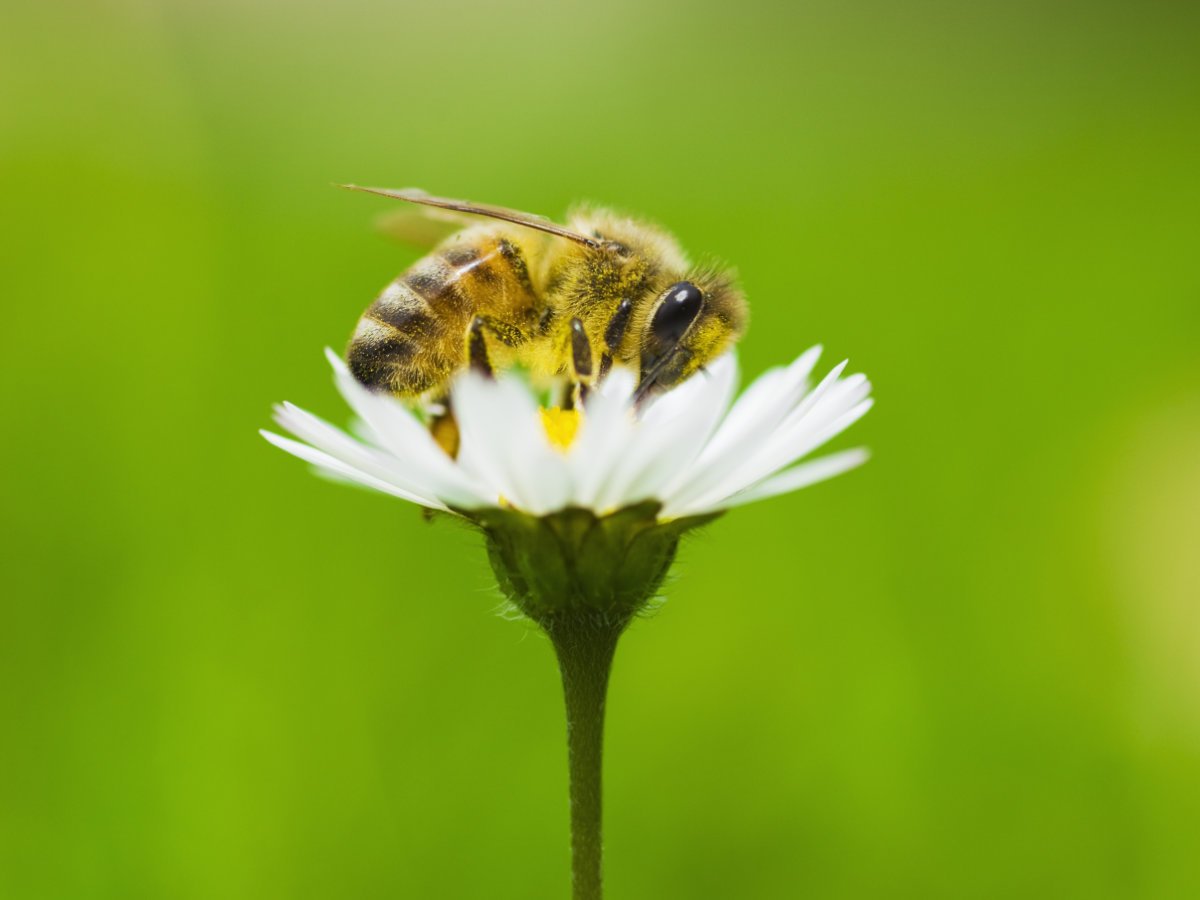
In Saudi Arabia, the Imam Turki bin Abdullah Royal Reserve hosts 25,737 beehives across 256 sites, fostering honeybee populations in a thriving and protected environment.
“The reserve provides a naturally protected environment rich in flowering plants, which serve as a primary source of nectar and pollen,” Abdulmajeed Al-Dhaban, a spokesperson for the reserve’s development authority, told Arab News.
“This ideal ecosystem enables bees to produce large quantities of high-quality honey, as well as other hive products like beeswax and royal jelly, which hold significant nutritional and economic value.”
Opinion
This section contains relevant reference points, placed in (Opinion field)
Thanks in part to the bees’ services, the reserve plays a vital role in enhancing the Kingdom’s food security.
“In addition to honey production, the reserve’s diverse ecosystem sustains natural pollination cycles,” Al-Dhaban said.
“This contributes to the productivity and quality of nearby cultivated crops and aligns with Saudi Arabia’s national efforts to achieve food security and self-sufficiency.”

Noting that pollination has a critical impact on the global food system, Al-Dhaban said bees are among the most efficient agents for transferring pollen between plants.
“This process not only enhances seed quality and density but also boosts agricultural crop production in terms of both quantity and quality,” he said. “Bee activity contributes directly to the production of honey, a valuable food product with significant health and economic benefits.”
Al-Dhaban also emphasized that honeybees are crucial for supporting food security and ensuring the long-term sustainability of natural resources.
This is particularly important as the reserve’s biodiversity creates an ideal environment for key Saudi crops, including acacia, Sidr trees and caper shrubs.
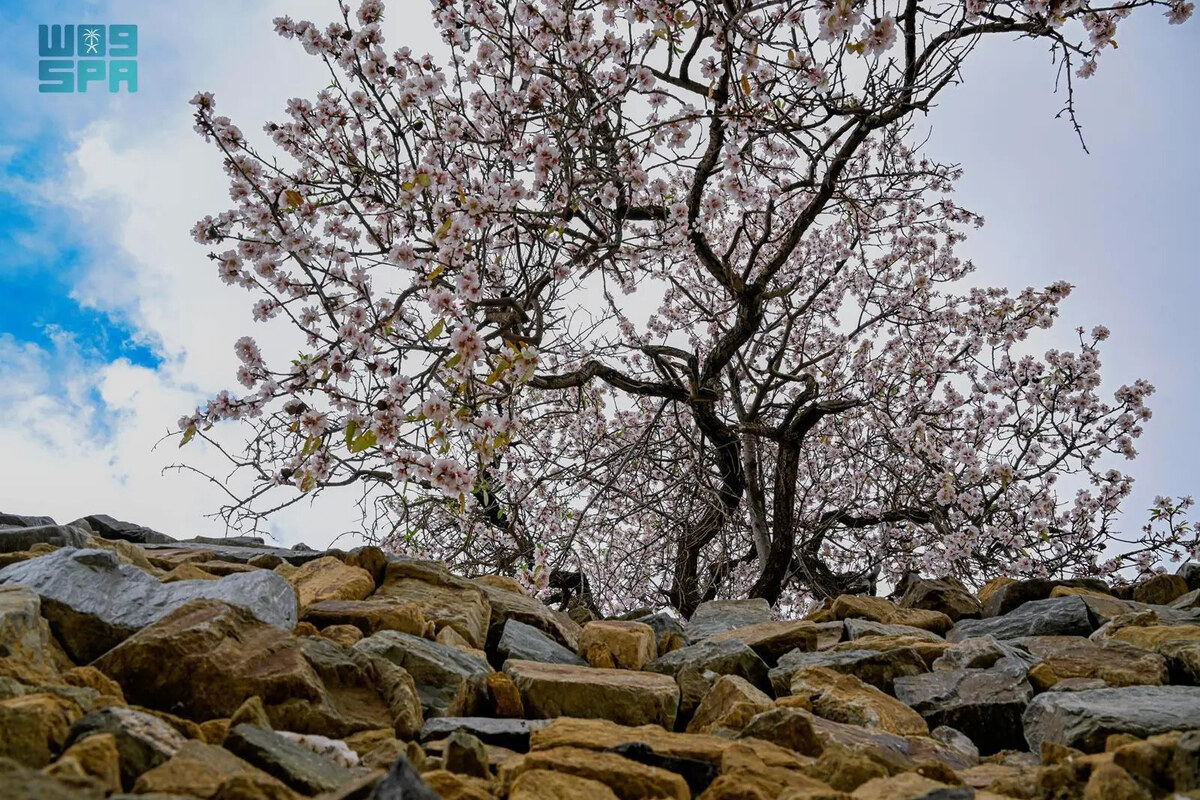
These plants benefit directly from bee pollination, which also increases the production of high-quality nectar for honey and other hive products. This natural cycle, Al-Dhaban said, supports local food supplies and strengthens the regional economy.
“By reducing reliance on imports and promoting local honey production, the reserve positions Saudi Arabia as a leader in sustainable honey sector development,” he said.
However, honeybee populations face serious threats, including climate change, habitat loss, pesticide use and disease.
To tackle this challenge, Mefleh Al-Jabreen, a beekeeper and owner of mobile apiaries at the Imam Turki bin Abdullah Royal Reserve, highlights the importance of selecting bee breeds that balance honey production and reproduction.
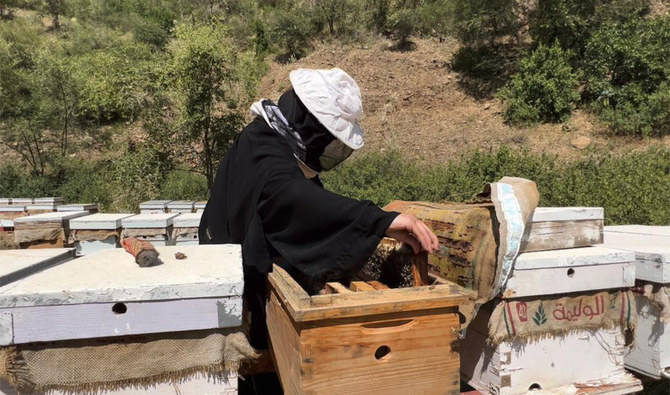
He told Arab News that his bees are transported to pastures rich in wild flowering trees, providing them with abundant nectar and pollen.
“We extract a specific amount of honey during gathering periods, leaving enough for the bees to sustain their hives,” he said.
Al-Jabreen explained that these sustainable practices help to maintain healthy honeybee populations while ensuring high-quality production.
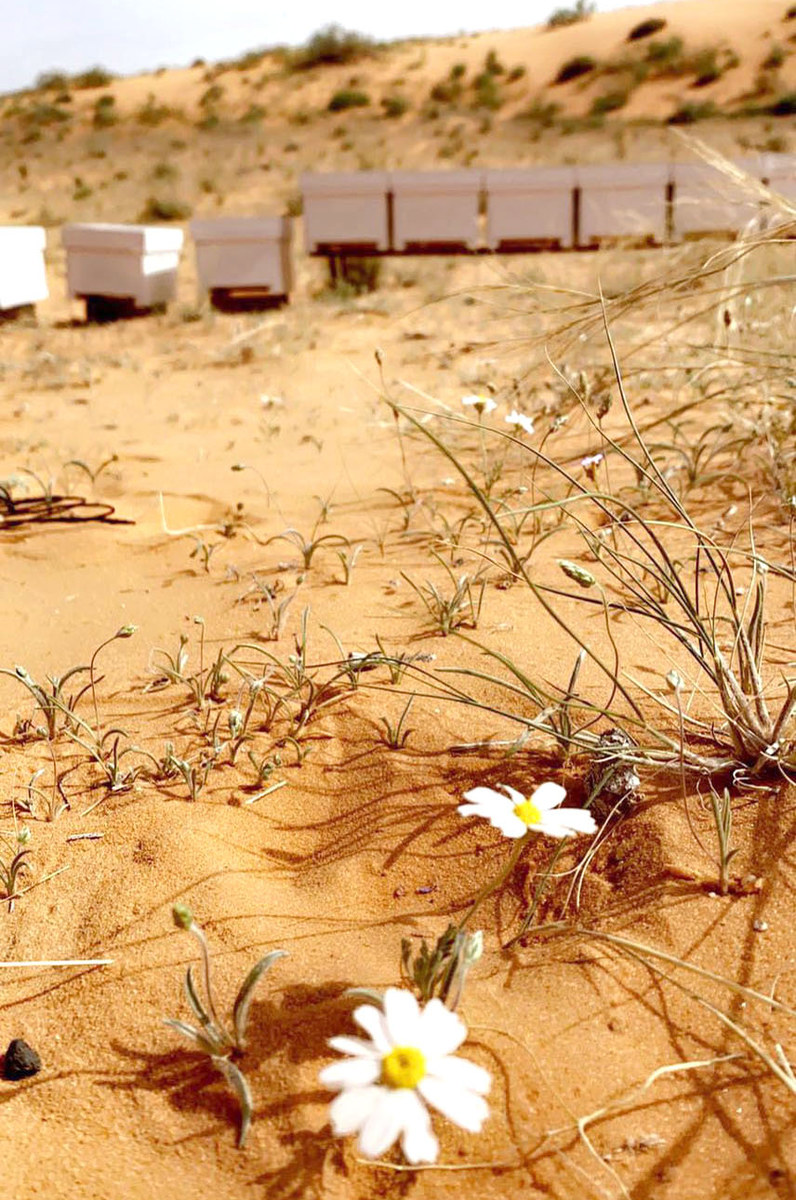
The reserve’s botanical diversity also supports the production of more than seven varieties of wild honey, many of which have earned international recognition for their quality.
Al-Jabreen also noted that the health of a hive largely depends on the queen bee. “A young, active queen laying eggs abundantly forms the foundation of a stable hive,” he said.
DID YOU KNOW?
• Crops, such as almonds and vanilla, are almost entirely dependent on honeybee pollination.
• Honeybee pollination prevents any single plant species from dominating, maintaining ecosystem balance.
• A young, active queen laying eggs abundantly forms the foundation of a stable hive.
He added that it is also crucial to monitor the number of worker bees and ensure the hive remains free of diseases and parasites, which can threaten colony stability and productivity.
Environmental challenges, such as extreme temperatures and unpredictable weather, pose significant threats to honeybee health, disrupting key hive processes such as honey production and reproduction.
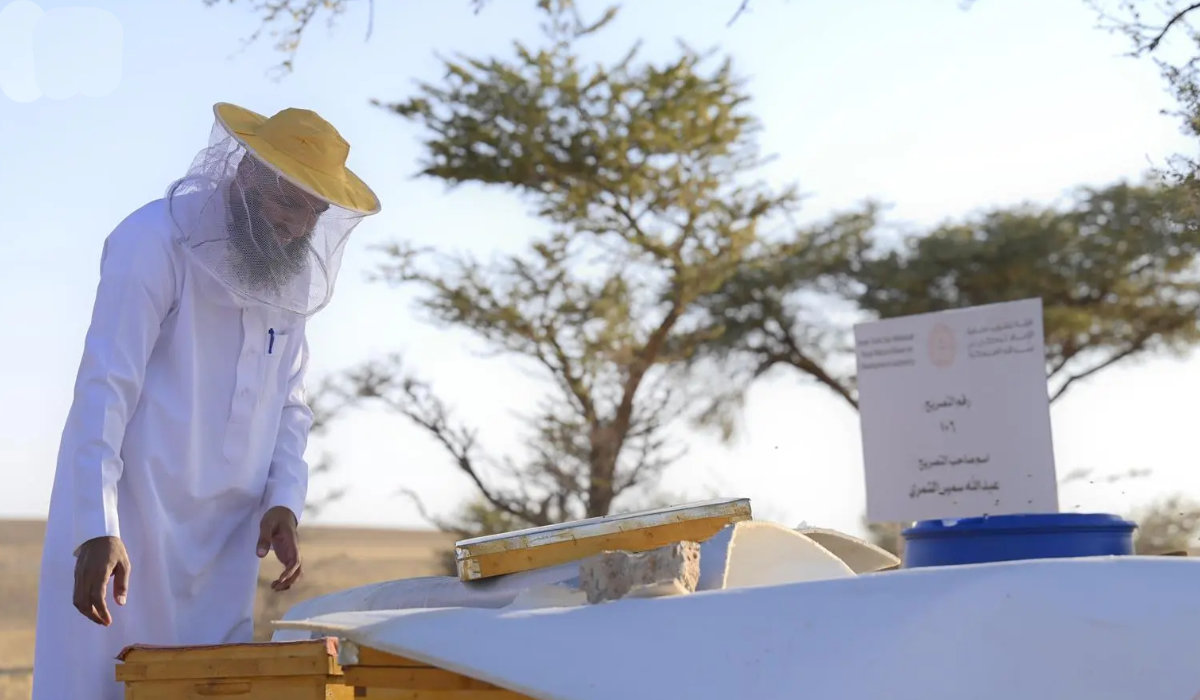
Al-Jabreen said that several factors must be considered when addressing these challenges: “These strategies include hive insulation, which helps reduce heat stress in extreme temperatures.”
Meanwhile, tree cover and shaded areas protect hives from direct sunlight during hot weather, while relocating hives to coastal regions in winter helps to keep bees active and productive.
“Windbreakers and hive relocation shield honeybees from strong winds and cold climates,” he added.
Al-Jabreen emphasized that plant diversity is essential for the survival of honeybees. “Bees are a vital part of the interconnected ecosystem, and their well-being depends on an abundance of floral and crop resources,” he said.
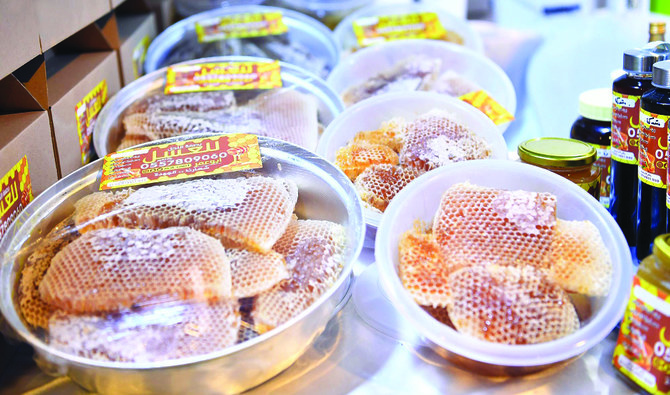
Recent innovations in beekeeping are helping to protect honeybee populations and enhance hive productivity. Al-Jabreen highlighted several key advances, such as special pollen-collecting boxes and bee breeds adapted to local climates.
He also hailed the growing collaboration between beekeepers and farmers. Organic farming practices, which avoid harmful chemicals, create safer environments for bees to thrive.
“We work with farmers to coordinate pesticide spraying schedules and relocate hives to safer areas,” Al-Jabreen said.
With growing threats to honeybee populations, governments, researchers and communities must prioritize their protection. Safeguarding these vital pollinators is key to ensuring a sustainable future for ecosystems, agriculture, and global food security.

Tajani says Syrian leader pledged to stop ‘illegal immigration’

- Tajani also met his new counterpart Asaad Al-Shaibani, after which the Syrian official said he would soon make his first official tour of Europe
BEIRUT: Syria’s new leader Ahmed Al-Sharaa told visiting Italian Foreign Minister Antonio Tajani on Friday that he was ready to stem “illegal immigration” to Europe, the European diplomat said.
“Al-Sharaa says he is ready to block illegal immigration, (and) fight against drug traffickers,” Tajani said in the Lebanese capital, the second leg of his trip, adding these were “two crucial commitments for Italy.”
Tajani said he had called for a moratorium on EU sanctions on Syria for six months or one year.
However, Tajani added that “lifting sanctions is not a national decision. They are a European bloc decision.”
Tajani also met his new counterpart Asaad Al-Shaibani, after which the Syrian official said he would soon make his first official tour of Europe.
“I am pleased to announce my intention to head a high-level delegation on a foreign tour that includes a number of European countries,” he said. Al-Shaibani has already visited Saudi Arabia, the UAE, Qatar and Jordan since the start of the month. Tajani arrived after hosting talks with European counterparts and US Secretary of State Antony Blinken in Rome on Thursday, where Tajani said they are seeking a “stable and united Syria.”
The EU’s foreign policy chief Kaja Kallas earlier on Friday said the 27-nation bloc could begin lifting sanctions if Syria’s new rulers took steps to form an inclusive government that protects minorities.



















